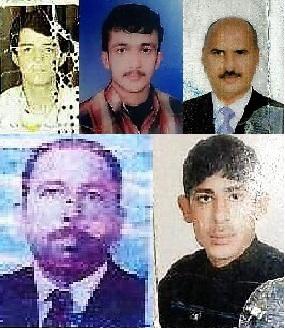
Over the course of September 2017, Alkarama and Al Wissam Humanitarian Assembly have submitted five cases of enforced disappearances in Iraq to the United Nations Committee on Enforced Disappearances (CED).
These cases represent part of the systematic practice of enforced disappearance in Iraq, where the rate of missing people remains one of the highest worldwide.
Iraqi army and Popular Mobilization Units both guilty of enforced disappearances
Alkarama submitted the cases of Ali Al Sharifi and Abdul Mohaiman Al Bazi to the CED, both of whom have been missing since 2014 when they were disappeared by the Iraqi army and Popular Mobilisation Units (PMU), respectively.
On January 24, 2014, Ali Al Sharifi, a 34-year-old bus driver, was driving his car when he was stopped at a military checkpoint situated on the main road of Latifiya, manned by the Iraqi Army Division No. 17. Al Sharifi was subsequently handcuffed, forced into a military vehicle, and taken to an unknown location, while his vehicle was confiscated by the soldiers. Since his abduction, Al Sharifi’s family has not received any information on his fate and whereabouts.
Six months later, Abdul Mohaiman Al Bazi, a high school student, was returning to his home town of Samarra in a shared taxi when they were stopped at a checkpoint under the joint control of the Federal Police and the Saraya Al Salam brigade. Mr Al Bazi was subsequently arrested by the police and militiamen.
The Saraya Al Salam militia was formed in June 2014 by the Shia cleric Muqtada al-Sadr in response to the Islamic State’s territorial gains in Iraq. It is part of the PMU, an umbrella organisation composed of 67 militias currently embedded in the Iraqi army. On November 26, 2016, the Iraqi Parliament passed a bill granting the PMU full legal status.
Al Bazi’s family inquired about his whereabouts at the local council of Saladin Governorate, as well as at Al Taji Camp Prison, Tasferat Al Sh'aab Prison, and the Central Criminal Court in Baghdad, but his name could not be found in any of the detainees’ registries.
It is believed that Abdul Mohaiman Al Bazi was abducted on the basis of his family’s past involvement with the Al Sahawat militia between 2006 and 2014. Al Sahawat was a Sunni military group that had been mobilised by US military commanders in 2005 to resist Al Qaida. It was dismantled by the Iraqi government prior to the rise of the Islamic State (IS).
Three abductions on the Baghdad to Mosul road in June 2015
Alkarama has also submitted the cases of Khaled Al Gehiche, Yassin Al Saffar and Salem Al Hadidi to the CED. The three men were abducted over the course of a few days in June 2015 while they were travelling on the road between Baghdad and Mosul.
On June 13, 2015, Khaled Al Gehiche, a 43-year-old taxi driver, was transporting several passengers from Baghdad to Mosul as part of a convoy comprised of 14 other vehicles. When they reached a checkpoint in Haswa manned by members of the Hezbollah Brigades, the militiamen arrested Mr Al Gehiche along with all the other men travelling with him. The militiamen spared the women and the elderly who were allowed to continue their journey to Mosul.
Two days later, Yassin Al Saffar and Salem Al Hadidi disappeared under similar circumstances. Yassin Al Saffar, a 43-year-old daily worker, was returning to Mosul from Baghdad after undergoing a treatment for kidney failure. He was arrested at a checkpoint by the Hezbollah Brigades along with 68 other people.
Salem Al Hadidi, a 31-year-old truck driver, was abducted on the same day as Al Saffar at a checkpoint in Rahhaliyah while he was travelling between Baghdad and Mosul. He was abducted by members of the Hezbollah and Abu Al Fadhal Al Abbas brigades.
There are many other cases of victims arrested in similar circumstances for the sole reason that they were from the Mosul region (Nineveh), an area formerly under the control of the Islamic State (IS). Although the Nineveh province has been fully recaptured from IS, the families of the disappeared were forcibly displaced amid the clashes that occurred between 2016 and 2017, seriously hindering their access to domestic remedies. The victims’ families have thus been unable to report the disappearances of their relatives.
A systematic practice
“These five cases are part of a wider pattern of systematic enforced disappearances that prevails in Iraq,” said Inès Osman, Legal Officer for the Mashreq at Alkarama. “Since the escalation of fighting between IS and pro-government forces, military checkpoints have become the location of regular abductions and enforced disappearances carried out by soldiers or state-sponsored militias in Iraq. The Iraqi authorities invoke the fight against terrorism and the war against IS to justify and carry out mass arrests followed by incommunicado detention, operating outside any legal framework.”
For more information or an interview, please contact media@alkarama.org (Dir: +41 22 734 1008).
